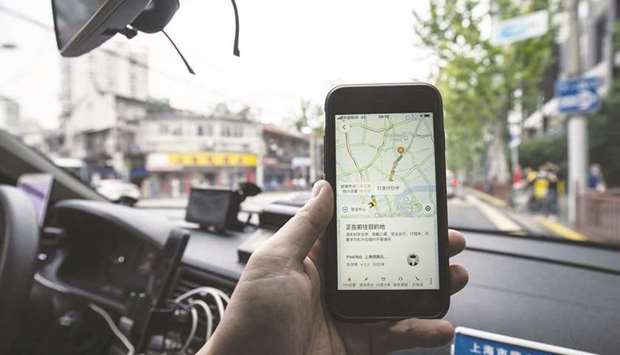Chinese ride-hailing giant Didi Chuxing Technology Co is accelerating plans for an initial public offering to as early as next quarter to capitalise on a post-pandemic turnaround, people familiar with its plans said.
Didi, the largest investment in SoftBank Group Corp’s portfolio, is targeting a valuation above the $62bn it secured during its last funding round, the people said, asking not to be identified discussing an internal matter.
The company moved up plans from a previous target of late 2021 after its Uber-like car-hailing business bounced back with China’s success in bringing Covid-19 under control.
Based on a common 15% float for mega IPOs in Hong Kong, one potential venue, Didi could raise roughly $9bn in what would be one of the largest tech debuts globally in 2021.
The company hasn’t made a final decision on the listing location, one person said. Didi’s plans remain preliminary and the timing could still slip till later in the year depending on negotiations.
An IPO would cap a remarkable turnaround for a company that ran afoul of first regulators and then Covid 19. It hopes to tap the same investor enthusiasm that propelled tech debuts this year from China’s video service Kuaishou Technology to South Korean e-commerce pioneer Coupang Inc.
“Didi wants to capitalise on the red-hot market for China IPOs,” said Brock Silvers, chief investment officer at Hong Kong-based private equity fund Kaiyuan Capital.
Didi president Jean Liu said last year the company’s core business had already begun making small profits. Daily rides and revenue have surpassed pre-pandemic levels and are now at record high, the people said. “Didi doesn’t comment on market speculation and doesn’t have a definite IPO plan or timeline,” the company said in a statement.
The company is looking for capital to expand into online commerce and bankroll a major foray into Europe, where it must compete with Uber Technologies Inc Didi, which remains the dominant player in China despite competition from the likes of Dida Inc, is also looking to leverage that lead to expand into adjacent arenas from autonomous driving to electric vehicles.
Dida filed for a Hong Kong listing last year.
“The barely profitable company thinks that a market sensing the end of Covid is supportive, but there may be red flags” in its costly overseas and business expansions, Silvers said.
Founded by former Alibaba Group Holding Ltd staffer Cheng Wei in 2012, Didi clashed with Uber in China for years until its American rival retreated in 2016, selling its operation in the country to its local rival. Didi secured a near monopoly, but then suffered a series of blows to its business and reputation.
In 2018, a pair of murders committed by contracted drivers spurred a regulatory investigation into its ability to police a vast network used by hundreds of millions. Its shares traded at a 40% discount to its last valuation - even before the pandemic erupted and knee-capped its business.
Didi’s stock is trading in the secondary market at about $43 to $49 per share currently, just below the $51 that SoftBank bought in at before the government probe, one of the people said.
Backed by Tencent Holdings Ltd, Didi now operates in 14 countries outside its home base, mostly in Latin America. In August, it began offering car-hailing services in Russia, marking its first direct foray into Europe, and it’s already an investor in Estonia-based Bolt Technology OU, the continent’s main rival to Uber. Didi would also be competing against apps like Gett Inc, Ola and BlaBlaCar.
Its debut would hand another triumph to SoftBank and founder Masayoshi Son, who have profited from a number of high-profile debuts in recent months including Coupang and DoorDash Inc.
The Japanese billionaire made ride-hailing the cornerstone of his startup portfolio, investing more than $20bn in Uber, Didi, Southeast Asia’s Grab and India’s Ola.
Uber, where SoftBank remains the largest shareholder, is an example of how investor sentiment has changed over the past year. The US ride-hailing giant saw its shares plummet early last year, but they have since surged several fold on the prospects of an economic recovery.
Son, who had drawn heavy criticism for investment bets like WeWork, has profited from the market’s recovery and is riding a wave of IPOs from his portfolio. Still to come may be Chinese social media giant ByteDance Ltd, valued at an estimated $180bn, and Indonesia’s Tokopedia.
Son invested more than $10bn in Didi, according to one of the people. The Chinese startup will not have the kind of return that SoftBank saw from Coupang or DoorDash. But any return on the Didi investment will likely prove a relief after its long-standing struggles.

The Didi Chuxing ride-hailing app is displayed on a smartphone in an arranged photograph in Shanghai. Didi is accelerating plans for an initial public offering to as early as next quarter to capitalise on a post-pandemic turnaround, people familiar with its plans said.
